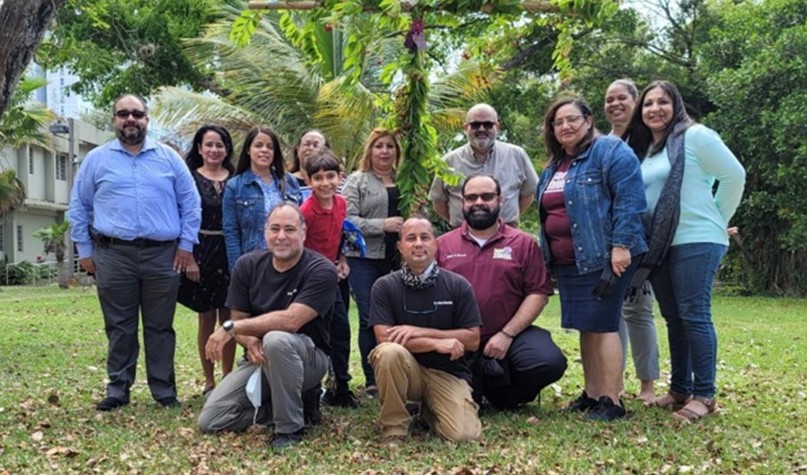Let’s Go Fishing
Raul Santiago Rivera works with the Evangelical Seminary of Puerto Rico.
Toward the end of 1994, during my military service, I received reassignment orders transferring me from Fort Lauderdale, Florida, to Dothan, near Fort Rucker, Alabama. Even though my military service has taken me to Virginia, South Carolina, and Georgia, my experience outside the base was extremely limited. My previous assignments were for training. On the duty assignments not involving training, my official travel kept me away most of the time. However, this time I was assigned to permanent duty outside the city of Dothan, Alabama, to a unit with a local mission. The opportunity to experience the local style of living was great.
During my time living in the south, I met an extraordinary person who took it upon himself to guide me through authentic southern experiences. Perry Dee was a lifelong southerner from Geneva County. He had worked the land, fished every pond available, and hunted in every hunting season since he could remember. I was born and raised in the southwest of Puerto Rico. At a young age, I was taught the art of farm living. I learned to milk cows, neuter pigs, and not to play with the chicks when mama hen is around (it could get scary). Fishing and hunting were not part of my upbringing. Therefore, Perry decided that I would learn to fish and hunt as many true Southerners do.
My first lesson would be hunting a deer. As a birthday and Christmas present, Perry prepared a couple of rifles and a bow, got us a thermos with hot black coffee, and drove us to a field with some deer stands. We got up on the deer stands and waited. However, the deer forgot we were waiting for them and did not show up. I froze that morning up on that deer stand while the animals were warm and cozy wherever they passed the night. I must say, I have never hunted again.
Because my hunting experience did not go as planned, I would not avoid a fishing lesson. So, on a warm Saturday afternoon, Perry Dee got a couple of fishing rods, found some worms from the back yard, and marched me down to the fishing pond. He showed me how to hook a live worm and throw the hook and bait to the specific location he wanted. It took a minute, but I got the hang of it. This was better than waiting for the deer that never showed up. After several tries, I finally got something.
I yanked the fishing rod as instructed. I reeled the fishing line slowly and firmly until I had the fish. It was a rush I had never experienced, and I liked it. It felt good to follow Perry’s instructions and guidance until I got my fish. And what a fish! An ugly, rough-to-the-touch, and slimy fish. A fish with a wide mouth and cat whiskers. So, I unhooked it and threw it back in the pond. Perry, was shocked at what I had done. He asked why I threw the fish back in the pond. He claimed that it was a great fish, and I had let it go. I replied that it was an ugly fish, and I would not eat such a thing. At that moment, he reminded me that it was a catfish – a fish I had been eating all along.
The writer of the Gospel, According to John, wrote: “And he said unto them, Cast the net on the right side of the ship, and ye shall find. They cast therefore, and now they were not able to draw it for the multitude of fishes.” (John 21:6 KJV). After a long night of empty fishing, the disciples were getting ready to hang their nets for the day. Jesus appeared to them and told them to cast the net to the ship’s right side. They caught so many fish that the fishing nets were full. The disciples did not care about the size, color, or type of fish they caught. They were happy and grateful for the fishing. Contrary to what I did when I encountered an unfamiliar fish that I deemed useless, throwing it back into the pond, the disciples embraced the catch.
Every day, the Evangelical Seminary of Puerto Rico strives to prepare its students to throw the nets of the redeemer and merciful gospel into the world. The full-time and adjunct faculty provide students with biblical exegetical knowledge, theological understanding, and pastoral experience to prepare them to throw the nets of the gospel into the world. The practical theology course transforms the knowledge gained into action and living testimony. The staff provides administrative support, research library assistance, and a campus environment that invites students to seek God’s wisdom and encourages them to serve the Kingdom of God. Donors, contributors, and supporters provide financial support to continue the Seminary mission.
People needing a helping hand, compassionate support, justice, and theological guidance are waiting for us to throw the net. We are being called to go fishing, to throw the net. We are being called to go fishing without reservation, prejudice, or reservation of whom the Lord may place into our net. So, let’s gather our nets, get into our ships, sail into the communities in need, the rejected and marginalized groups of society, and throw the nets of compassion, justice, and redemption. Let’s stop being selective about our fishing. Let’s stop conditioning whom we help. Let’s go out there and fish for the Lord.
Raul Santiago Rivera works with the Evangelical Seminary of Puerto Rico. His appointment is made possible by your gifts to Disciples Mission Fund, Our Church’s Wider Mission, and your special gifts.
Make a gift that supports the work of Raul F. Santiago Rivera

